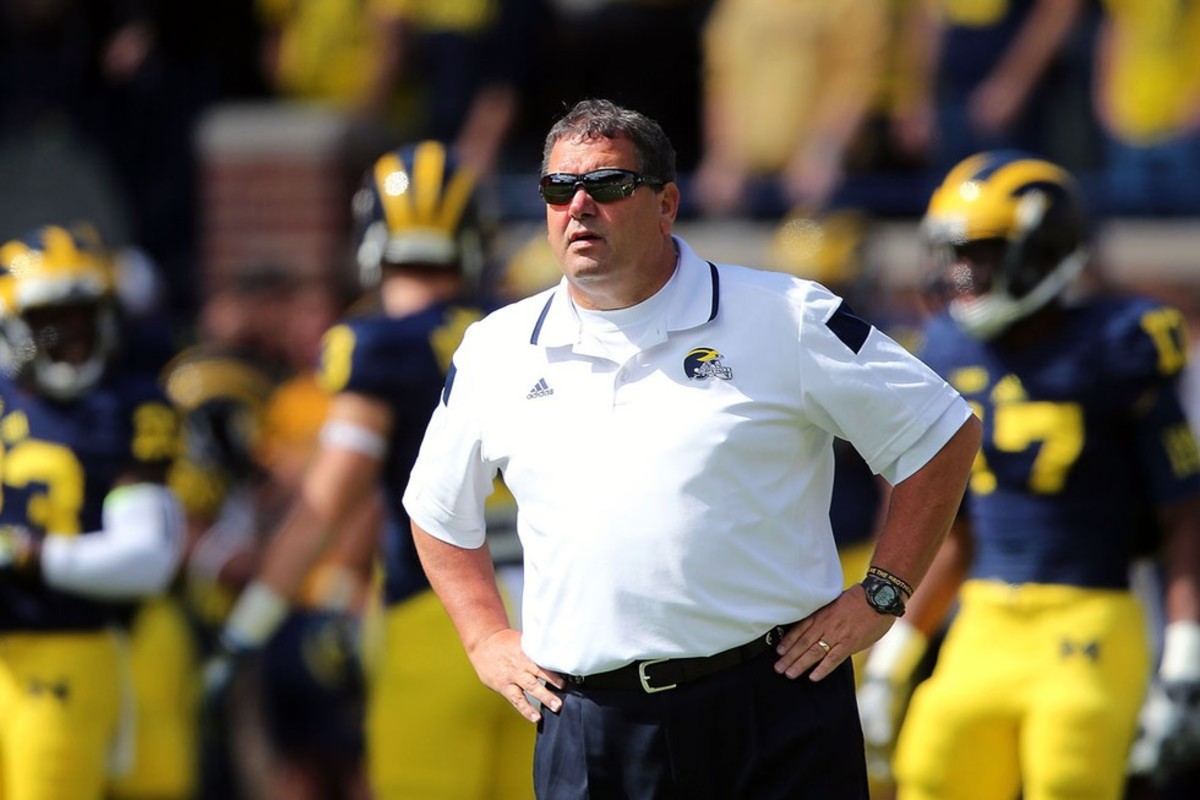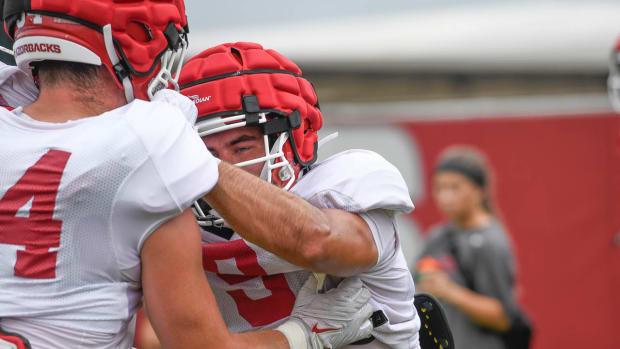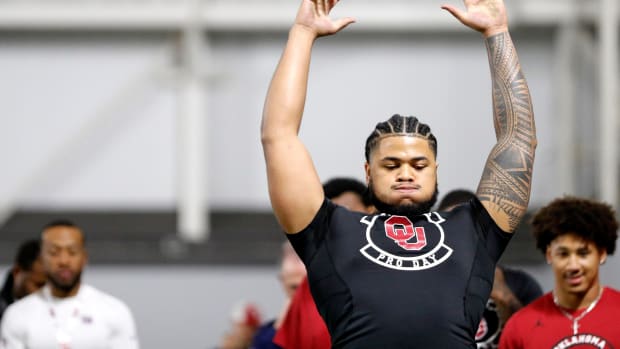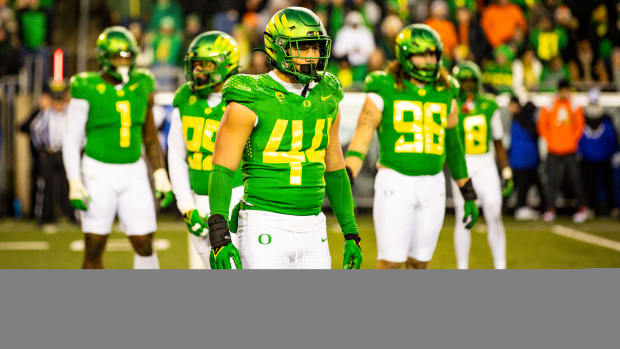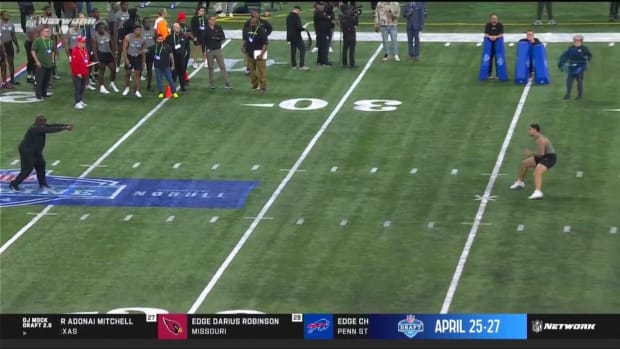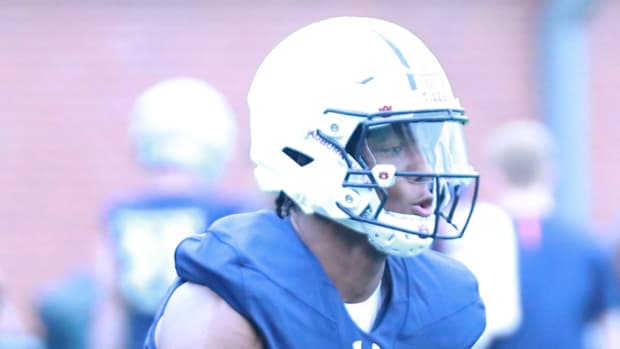Former Michigan coach Brady Hoke opens up about Wolverines, punt, Harbaugh, coaching future, more
After spending much of the 2014 season at Michigan being criticized for not wearing a headset on the sideline, Brady Hoke has spent '15 wearing one. Hoke sold his house in Michigan, moved with his wife, Laura, to North Carolina and has done a Sirius XM radio show twice a week. "I may wear a headset again [on the sideline]," he says with a chuckle. "I'm getting used to it being on the radio. Now it's become a habit."
Hoke, 56, is eager to get back to coaching and hopes to get a head job in the one of the Power Five conferences. (He does admit to feeling uneasiness tracking the job market considering he just endured the tumult of being fired.) Hoke brings a 78–70 record in 12 years, including winning Coach of the Year awards in the MAC (2008), Mountain West (2010) and Big Ten (2011). Hoke spent the last few months visiting programs from Tennessee to TCU to Oregon, trying sharpen his understanding of spread offenses and what makes other successful programs tick. He'll return with more respect for the media, an appreciation of tailgating and confidence that Michigan's success under Jim Harbaugh "validates" his rebuilding job there. Hoke recently spoke with Sports Illustrated about all those topics and more.
SI: Tell me a little bit about what you're looking to do in getting back into coaching.
Brady Hoke: I think the general scope would be hopefully be in a Power Five conference. I think that would be ideal. The one thing I want to say is that Rich Rodriguez is a good football coach. He didn't forget football when he went to Michigan. And obviously he hasn't forgotten it when he left. I haven't forgotten how to coach. You look at a guy like David Cutcliffe (at Duke), I have a lot of respect for him. He's at a place he wants to be at.
SI:When was the last time you didn't have a season coaching?
Hoke: It's been 33 years since I wasn't on the sideline either coaching a high school or college team. Other than my family, my true passion is coaching and mentoring young men and teaching them life lessons through football. The quality of life we've had this past six months, it's been nice. But it's time to get back.
SI:A lot of coaches who leave the sideline and do TV or radio return to coaching with a better perspective of the media. You were pretty guarded at Michigan. Will your experience change that?
Hoke: I would think it would a little bit. You still have to be who you are. At the same time, especially late at Michigan, there were times I was a little more guarded. But I came in that way, also. I think experience has helped me understand where guys or gals are coming from. They have a job to do and I respect that.
It does change your perspective a little bit, especially the preparation and research. I can tell you I know a lot more about other teams than you would coaching. Working with Mark Packer has been great, he's such a professional in how he prepares.
SI:What did you learn from your time at Michigan?
Hoke: I think we all grow. If you are a competitor, you always want to evaluate and self-evaluate. This may sound odd. I look at what we did at Michigan in the years we knew would be transitional—2013 and 2014. We knew those years were going to be a struggle. We recruited three classes in the top 10 and two in the top five. We recruited families and student-athletes who fit the culture and the vision. Always based everything on commitment and being accountable to each other. The respect we have for everyone and the trust.
When you look at it, one of the things is that I may have to wear a headset again. I'm getting used to it being on the radio. Now it's become a habit. I think in ways that you grow and you mature as a coach. Believe me, I thought we did a nice job of putting a program in place. With the success that Michigan is having right now, it reassures you we had a plan. That validates you. Jimmy (Harbaugh) is a good coach. His staff is doing a good job. I think we did a nice job. It's never going to be a quick fix. I don't believe that. We walked into a program in 2011 with 15 fifth-year seniors. We had a special young man in Denard Robinson. Even in 2012, we were 11 seconds from beating an 11-win South Carolina team to get nine wins. Those two years, we felt good about. We were recruiting for 2015 as much as anything. From the bottom up, we wanted long-term success and a great foundation established. From an academic standpoint, we graduated all 68 seniors who came through the program. The ARP rate is 1000. I feel like we did what we said we were going to do.
SI:So, that leads to a question I'd been waiting to ask. Does this 2015 Michigan season serve as a compliment to you as a program-builder? Or an indictment of you as a coach?
Hoke: Being the optimist, always, I would say being a program-builder. You have to remember; maturity is something that happens at all different times. I truly believe as head coach, it's my job to nurture the leaders and help them mature. In 2014, I think we had 58 true and redshirt freshmen. That was (basically) our 85 scholarships. Those guys, they grow. Everyone once in a while there's a guy like (offensive tackle) Mason Cole, who comes in as a true freshman and handles it.
I don't know if compliment is the right word. But I don't see it as an indictment because we were growing those kids. I truly believe that. Again, Jimmy and that staff have done a good job. I'm very confident in the development of what we did for that program and the players in it.
SI:You ended up in a few negative headlines this week for saying you wouldn't have punted at the end of the Michigan State game. What did you mean by that?
Hoke: I didn't say that to criticize Jim. I prefaced it by saying it's easy to comment three days later, as opposed to the heat of the moment. My only comment was that defense is the strength of Michigan's team. Because of the mechanics of the punt, I'd rather snap the ball to the quarterback and try and win the game. You have 1,000 of those snaps normally. If you make it, the game is over. You have your playbook, best pass, best whatever. If you don't make it, they only have a Hail Mary or a 60-yard field goal. Look, two years ago I went for two against Ohio State at the end of the game. I wasn't criticizing. I would play to the strength of my team. That was my comment.
SI:I assume you are rooting hard for those kids at Michigan considering you brought a majority of them in?
Hoke: Oh, no question about it. Those are some great families and great kids. You get attached to them and want nothing but the best for them. The toughest thing, in my opinion, when you take another job or are in a job and aren't retained, it's leaving those kids. The kids that you've built relationships with and families you've built relationships with.
SI: You worked for Jack Harbaugh and shared an office with John Harbaugh at Western Michigan. I'd assume you have a strong affinity for their family?
Hoke: Jack and Jackie (his wife) both came over for lunch and we had probably a three- or four-hour lunch. I have so much respect for the Harbaugh family. It was great that Jack has reached out, and we understand the same thing Jack went through when he was a head coach. That is a really a good relationship.
SI: Your brother, Jon, has been at South Carolina as defensive coordinator. What games have you been to in your new location?
Hoke: We're just north of Charlotte, near Lake Norman. It's been neat. We went and watched Davidson play Valparaiso two weeks ago. We watched South Carolina and Vanderbilt the other night. We've had access to a lot of different games. We got to tailgate a little bit. Had some ham and cheese sandwiches and a couple of Labatts. It was weird. It was really weird. It was great to be back on the grass, and thankfully my brother gives me a sideline pass. It just didn't last long enough.
SI: What's it like monitoring what coaches may get fired or take new jobs the year after you were fired?
Hoke: It is an odd situation. My wife and I talk about it all the time; there's no doubt about it that it puts a pit in your stomach a little bit. There's also that passion that you have of wanting to get back and be a head coach. I think I'm a very good head coach and mentor kids and from the coaching side. I've been Coach of the Year three times in four years in three different conferences. I do know that we are good at what we do. That starts with relationships with kids and families and treating them as our sons.
SI:There are so many variables that go into a winning football program: recruiting, academics, facilities, support and so much more. But above all, so much comes down to the quarterback position. Do you have any regrets about how you handled that at Michigan?
Hoke: A couple of things. The number one thing is that I take ownership for whatever we do as a football team. I have always been that way and was taught that way by my dad. I think the takeaway is, and you can see it with some of these guys who've gone into jobs with ready-made quarterbacks. The thing I know at the next opportunity, we will recruit quarterbacks. We are going to recruit and evaluate and have more options than we may need so that we can really find a guy who is going to be what you want within your offense. The year we took took Shane (Morris), we probably should have taken another quarterback. Not that we didn't believe in Shane. Just for more numbers, more competition.
SI:What do you think would be a good fit for your next stop?
Hoke: As I look at it, it has to be the right fit from an administrative standpoint. The right fit from a style of play, to some degree. That's not a must. I think the right fit when you look at recruiting base. It think that's awfully important. I have a lot of confidence that you can win at established programs anywhere. Most of the world probably thinks I'm crazy. Ball State hadn't won in seven years. We built a program (that won 12 games my last year) and has gone to two more bowl games since we've been gone. Pete Lembo is doing a great job there. Going to San Diego State, they hadn't won for 10 years. Rocky Long has done a great job and is a really, really close friend. I really feel like we laid the foundation there.
SI:Walk me though all the programs you visited this spring and fall. What was your impression of them?
Hoke: Oregon: It was great to see the pace they practice with, the format of the practice and obviously the offense. It was good to look more at that type of style and learn a little more about it.
• TCU: I've known Gary Patterson since the Mountain West days. He has a style of being a head coach and defensive coordinator and the organization he has in place to do that. At Ball State the last three years, I called the defense and was the head coach. That's something I would really like to do again.
• Tennessee: I wanted to get with Butch (Jones) and see the practice tempo. Their recruiting infrastructure is really, really good in how they do things and the staffing.
• Oregon State: I have a lot of respect for Gary Andersen back from when he was at Utah State. I looked at some schematic things on defense and how they teach things.
• Clemson: I was impressed with Dabo (Swinney) and what they're doing from top-to-bottom. It's one of those really good organziations.
• Florida State: I liked watching Jimbo (Fisher) and the boys get after it in practice. Their practice structure was good.
• South Carolina: My brother Jon is obviously there (as defensive coordinator), so that was neat. It was great to get to watch Steve Spurrier run practice. It was entertaining and also very useful.
Thearon W. Henderson/Getty Images
Stanford's Kevin Hogan has become exemplary leader
The day before each game, Stanford's offensive unit gathers for 15 minutes to watch the blitzes of its upcoming opponent. Senior quarterback Kevin Hogan runs the session and outlines the adjustments he plans to make for each defensive pressure. He also facilitates a discussion with the offensive line on how they will handle the blitzes.
"It's completely Kev's show," Stanford offensive coordinator and offensive line coach Mike Bloomgren tells The Inside Read. "We're like proud papas on the back row. We just shut up and listen."
The weekly meeting is a testament to the brainy Hogan's maturity. Bloomgren says he would be surprised if another college quarterback can detail protection schemes like Hogan does.
During Bloomgren's four years coaching in the NFL, he saw quarterbacks who couldn't do it as well as Hogan. "It's pretty cool," Bloomgren says. "That meeting really exemplifies his growth."
That's been evident on the field this season as Hogan is on pace for his best year in Palo Alto. He's completed 89 of 135 passes for 1,286 yards with 12 touchdowns and just three interceptions for Stanford (5-1, 4-0 in Pac-12) entering Saturday night's game against Washington (3-3, 1-2).
Hogan and the Cardinal offense have been a completely different unit after its disappointing performance in a 16-6 defeat at Northwestern to open the season. Stanford hasn't scored less than 31 points since then. That's a major reason why it is still in the hunt for the Pac-12 title.
"In a pro-style offense your quarterback usually gets too much credit or too much blame," Bloomgren says. "Right now, I don't know that (Kevin's) getting enough credit because he's executing everything. He's such a freaking coach on the field. He's doing all those things right. He's preparing like a five-year NFL vet the way he's taking everything on in the week, the way he's focused at meetings, going over stuff."
Stanford first started the protection meetings three seasons ago when Hogan was a second-year starter. Back then, Hogan wasn't nearly as confident and his voice often cracked while he led the sessions.
"Now he walks up there with his chest out and says, 'Alright, let's go. We're in this protection, this is their number one thing and this is how we're going to handle it,'" Bloomgren says. "He's so commanding. It makes me sleep so well (the night before games) after hearing him go through it."
Bloomgren should because Hogan hasn't been sacked much this season. After a recent protection meeting, Bloomgren and Cardinal quarterbacks and wide receiver coach Tavita Pritchard stopped Hogan.
"Do you realize how much you've grown?" Bloomgren recalls telling Hogan with a laugh. "You know what, maybe we'll like just take next week off and you can put in the whole damn thing. We'll just relax back here. You got it."
While Bloomgren expects Hogan to play in the NFL, he hasn't dared ask him if he'd ever be interested in coaching. "I think he would laugh at us," Bloomgren says. "I think he thinks he's too smart to ever do this profession. He's probably right."
Maybe Hogan is even smarter than Bloomgren thinks.
For a daily dose of college football insight, check out The Inside Read every weekday on Campus Rush.
